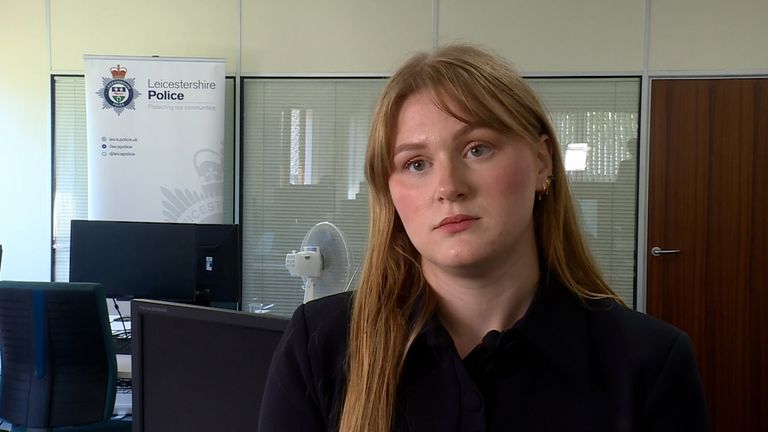A man who convinced his victim to attempt suicide and seriously self-harm online has become the first person sentenced under new internet safety laws.
Warning: This story contains details of encouraging self-harm and suicide which some readers might find disturbing
23-year-old Tyler Webb, from Loughborough, Leicestershire, was sentenced to 9 years and 4 months imprisonment, subject to a hospital order.
He will be taken back to hospital, and if he is ever deemed fit for release, he will serve out whatever time he has left on his sentence in prison.
Webb is the first person in the country to be charged with encouraging serious self-harm online under Section 184 of the Online Safety Act 2023.
He was also charged with encouraging suicide and pleaded guilty to both charges in May.
After meeting his victim - who cannot be named for legal reasons - in an online forum dedicated to mental health last year, Webb began grooming her over several weeks and persuaded her to self-harm, according to the police.
The victim sent Webb a photograph of her self-harm injuries, which prosecutors said showed he knew he had power over her.
Webb then convinced his victim to kill herself over a live video call while he watched. The suicide attempt failed, but only by chance, and the woman passed out on the call.
Webb repeatedly told her she had nothing to live for and gave her methods to end her life, according to the CPS.

"Tyler Webb is a person who is manipulative, he's dangerous, he takes gratification in seeing other people hurt themselves," said CPS prosecutor Alex Johnson.
"He's a very dangerous person."
In one 44-minute phone call, Webb persistently tried to get the woman to end her own life.
When it became apparent she would not do so, he said he would block contact with her and threatened to move on to another victim instead.
The woman then reported the interactions to the police, and Webb was arrested at his home by Leicestershire Police.

"She's gathered, from a police perspective, evidence that we could have never have dreamt of, in terms of being able to show his involvement and his guilt in this crime," said DC Lauren Hampton from Leicestershire Police.
"I just hope that other victims feel that they can show the same bravery that she has and come forward to the police if anything like this has happened to them."
After sending a recording of a call with Webb to the police, his victim listened to it again, concerned she had blown the call out of proportion.
"She felt so guilty for getting him in trouble that she wanted to listen to the recording to see if she remembered it as being as bad as it was," said DC Hampton.
When she did that, the effect that he had had on her continued, and Webb's victim followed his instructions again.
What is the Online Safety Bill and what offences does it cover?
The Online Safety Bill came into law in October 2023 with the aim to help keep inappropriate and potentially dangerous content away from vulnerable eyes.
It does this by imposing rules on search services and platforms that allow users to post content online or to interact with each other - think Meta, Apple and Wikipedia.
A number of new offences have been introduced by the bill, including encouraging or assisting serious self-harm, cyberflashing, and epilepsy trolling - deliberately sending an image or video designed to trigger a seizure in people with epilepsy.
As part of implementing the bill, independent regulator Ofcom has set out a series of child safety rules which will come into force for social media, search and gaming apps and websites on 25 July.
The rules aim to prevent young people from encountering the most harmful content relating to suicide, self-harm, eating disorders and pornography.
Companies found to be in breach of the bill can be fined up to £18m or 10% of their annual global turnover.
This further suicide attempt resulted in her being in intensive care for several days, according to DC Hampton.
"This wasn't some sort of fantasy or role play," said Mr Johnson of the CPS.
"A search of Tyler Webb's digital devices showed that he had drawings and images depicting hangings and decapitations and sexual violence against women."
Read more from Sky News:
'Silent killer' heatwave thought to have left at least 9 dead in Europe
UK content creators demand formal recognition from the government
This sentencing isn't just an important moment for Webb's victim, who police say likely saved others from being targeted by the predator; it is also the first time the 2023 Online Safety Act has been tested in court.
"This conviction shows that we have an effective new tool to use against people who are determined to cause this sort of harm online," said Mr Johnson.
Although encouraging suicide has been a criminal offence since 1961, encouraging self-harm online only became a specific offence two years ago.
Since Webb's charge on 12 July 2024, others have been arrested and charged with the new offence.
Anyone feeling emotionally distressed or suicidal can call Samaritans for help on 116 123 or email jo@samaritans.org in the UK. In the US, call the Samaritans branch in your area or 1 (800) 273-TALK.

 5 months ago
42
5 months ago
42






















 English (US)
English (US)